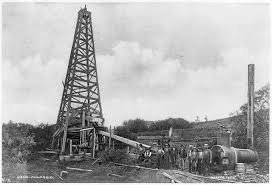History of oil & gas
As the Oil and Gas Industry works to develop energy resources and to accelerate the energy transition, “The Waterhouse Group” brings you the knowledge you need to make better business decisions in a dynamic market. “The Waterhouse Group” brings you the world of energy, explored!
API Gravity is (141.5/Specific Gravity at 60°F) – 131.5. Thus, the higher the API, the lighter the Oil.
When Was Oil Discovered?
The first Oil had been discovered by the Chinese in 600 B.C. and transported in pipelines made from bamboo. However, Colonel Drake’s heralded discovery of Oil in Pennsylvania in 1859 and the “Spindletop” discovery in Texas in 1901 set the stage for the new Oil Economy. Petroleum was much more adaptable and flexible than coal. Additionally, the kerosene that was refined originally from crude provided a reliable and relatively inexpensive alternative to “coal-oils” and “whale oil” for fueling lamps. Most of the other products were discarded.
With the technological breakthroughs of the 20th century, Oil emerged as the preferred energy source. The key drivers of that transformation were the electric light bulb and the automobile. Automobile ownership and demand for electricity grew exponentially and, with them, the demand for Oil.
By 1919, gasoline sales exceeded those of kerosene. Oil-powered ships, trucks and tanks, and military airplanes in World War I proved the role of Oil as not only a strategic energy source, but also a critical military asset.


Prior to the 1920s, the Natural Gas that was produced along with Oil was burned (or flared) as a waste by-product. Eventually, Gas began to be used as fuel for industrial and residential heating and power. As its value was realized, Natural Gas became a prized product in its own right.
The first Oil corporation was the “Pennsylvania Rock Oil Company” which was formed to exploit Oil found floating on water surfaces near Titusville, Pennsylvania the first successful Oil Well would later change the face of the Oil Industry forever.
Edwin Drake is often associated with the discovery of Oil, but it was his association with the “Pennsylvania Rock Oil Company” that sent him to the area to research and develop the possibility for the Oil Industry in the area.
The success of Edwin Drake’s Oil Well Drilling operations in Titusville, however, would attract attention. Within a decade, John D. Rockefeller and “The Standard Oil Company” would come to dominate the Oil Industry both in Titusville and across the nation.
WHO DRILLED THE FIRST OIL WELL?
The first Oil Well known to tap Oil at its source using this method was drilled by the “Pennsylvania Rock Oil Company” in Titusville, Pennsylvania. Edwin Drake was put in charge of developing Oil Industry potential in the area. It was Edwin Drake who had engaged William Smith, a well-regarded salt driller, to come to Titusville to oversee the drilling of the First Oil Well.
This first Oil Well was successfully drilled on August 27, 1859.
The success of this first Oil Well in Titusville would set off historical events, including the rapid formation of the “Standard Oil Company.”
It wouldn’t be until 1938 that the first Oil Well would be drilled in Saudi Arabia, tapping into what would soon be identified as the largest source of Oil in the world.
You Can’t Find Oil if You Don’t Drill Wells!

